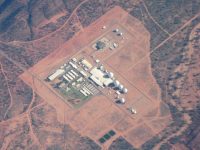Pine Gap: Enabling the US to Kill Civilians

If you ever find yourself in Alice Springs, try driving 18 kilometres south-west and you might spot Pine Gap, a small military base on the fringes of the city.
Its purpose has been clouded in secrecy since it was established in 1970, but thanks to a joint investigation by the ABC’s Background Briefing and the Intercept, we now know it plays a key role in enabling the United States global surveillance network – including spy operations, and providing intelligence to guide military drone strikes.
According to Emily Howie of the Australian Human Rights Law Centre, this should raise concerns for Australians and indeed internationally. While these strikes have killed a number of Al Qaeda, Islamic State and Taliban militants in recent years, they’ve also left a raft of civilian casualties in their wake, which may violate international law.
“The legal problem that’s created by drone strikes is that there may very well be violations of the laws of armed conflict … and that Australia may be involved in those potential war crimes through the facility at Pine Gap,” Howie told The Intercept.
“The first thing that we need from the Australian government is for it to come clean about exactly what Australians are doing inside the Pine Gap facility in terms of coordinating with the United States on the targeting using drones.”
47 Years of Bipartisanship on Pine Gap
Disturbingly, there’s been little debate about the role of Pine Gap in the 47 years since it was set up.
While the major parties disagree on some matters, they fall silent when it comes to questioning the growth of state surveillance, or Australia’s support of American foreign policy.
This was highlighted by Glenn Greenwald, the US lawyer-turned-journalist who co-founded The Intercept, during a recent talk at Sydney which Sydney Criminal Lawyers® attended.
As a journalist, Greenwald broke news of the Snowden Files in 2013, which the ABC/Intercept drew upon for their Pine Gap investigation.
“When I think about the Pine Gap story, there are a lot of fascinating implications to it if you’re an Australian.” Greenwald stated.
“You have your Government providing critical intelligence to the military of the United States, as it engages in a whole variety of aggressive attacks that kill civilians… All of this is done with the critical assistance of the Australian Intelligence Agencies and Pine Gap.”
“You can have a debate and say: ‘ISIS is coming, and I want my government giving the United States all it wants, because our security depends on it’… But if you don’t know what it is the Australian government is doing, in terms of the kind of acts of aggression it’s enabling then you can’t actually debate it. It’s an illusion of democracy.”
“It’s even more interesting now because the Trump administration changed the Rules of Engagement, just as he promised to do during his campaign, and are now killing the family members of terrorists, torturing civilians recklessly – again all through all with the critical assistance of your Government and its intelligence agencies.”
The Murky Ethics of Supporting US Drone Strikes
According to AirWars.org, a not-for-profit that tracks civilian casualties caused by airstrikes in the Middle East, the number of civilian casualties resulting from US-led drone strikes has hit record numbers since the election of Donald Trump.
Last month, the group estimated that Coalition airstrikes had caused between 347 and 524 civilian deaths in Syria and Iraq.
During his talk, Greenwald pointed to these deaths as proof of the need for more transparency about the role Australia plays in assisting the United States with these actions. Australia is already operating in murky legal, ethical and strategic territory because the drone killings have spread to countries where no state of war exists with Australia, such as Syria, Pakistan, Libya, Yemen, and Somalia.
There has never been a debate about whether it’s actually in Australia’s strategic interests to support America in these conflicts – in fact, some, like Greenwald, argue the base may be making Australia less safe.
Reasons to Question Support for Pine Gap
“The standard political response, that I know gets made here all the time… is that we need to have these activities at Pine Gap or the reason why we need to have massive surveillance is because we need to protect you all from terrorism.” Greenwald remarked.
“And typically the explanation given as to why there’s terrorism is because there’s this primitive hateful irrational religion out there that’s arbitrarily attacking us because they hate our way of life.”
“The thing I think is so fascinating is that there are very specific countries directly targeted through this kind of terrorism, and lots of countries that aren’t… look at Korea and Japan, or nations through South America – there’s lots of nations that are liberated in this way, that aren’t the target of attacks.”
“So when we think about why Australia is targeted with terrorist attacks… and why there are people that want to do violence to Americans… I think it’s so important to think about what it is that our our policies actually are, and their causal role in causing that terrorism.”
On second thought, if you ever find yourself in Alice Springs, maybe it’s better to avoid Pine Gap.






